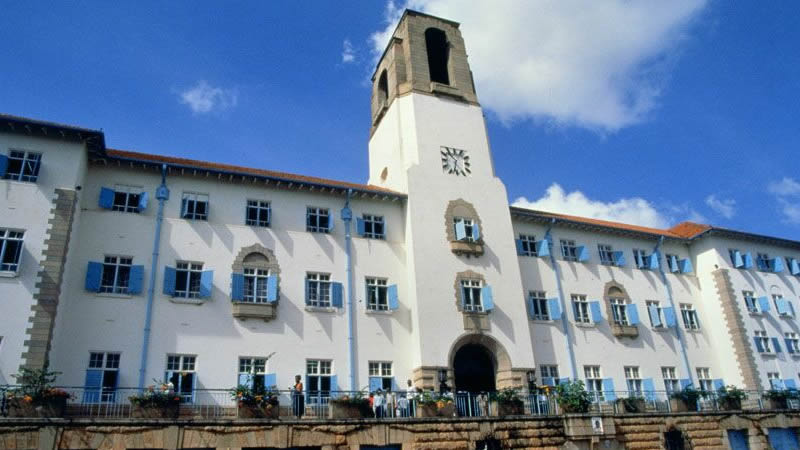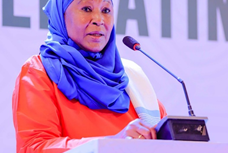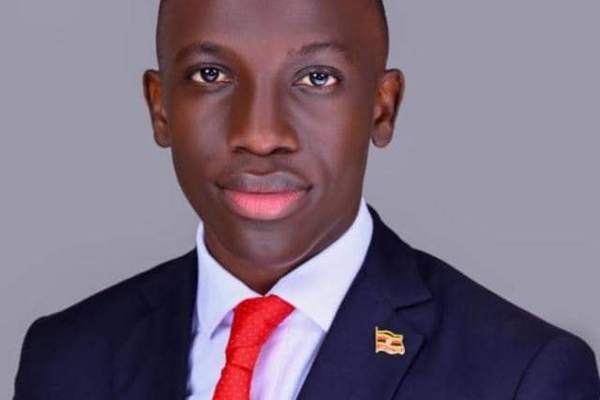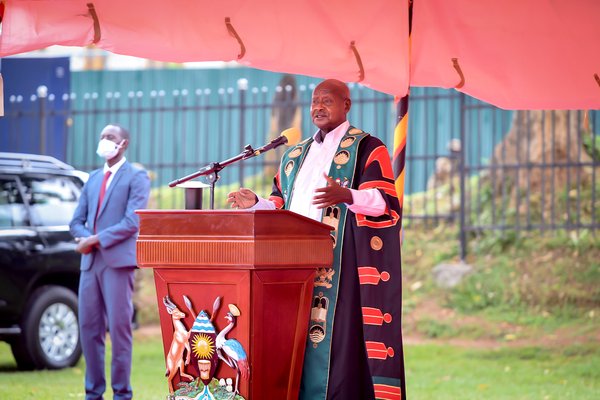By Mark Wamai and Immaculate Bazira
To give you an appreciation of some of the recent developments, the Makerere University Research and Innovations Fund (Mak-RIF), with funding from the Ugandan government, has increased the local generation of translatable research and scalable innovations that address key gaps required to drive Uganda's development agenda.
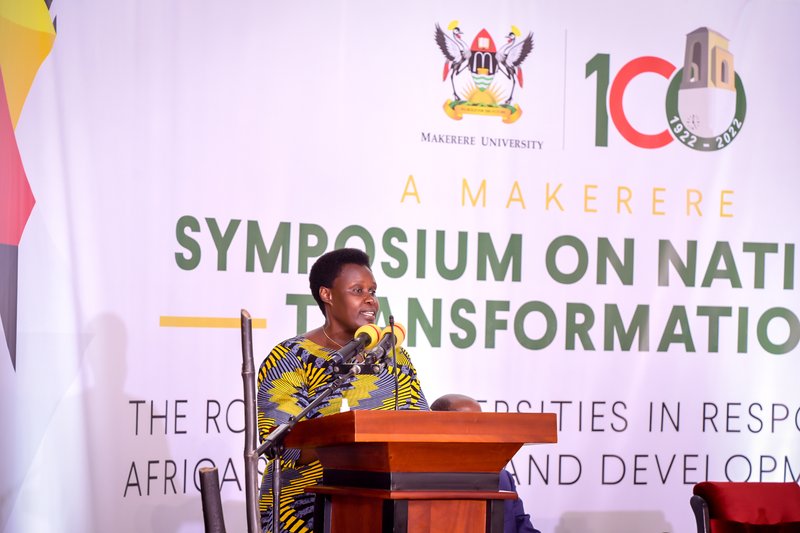
The Vice President of Uganda, H.E. Jessica Rose Epel Alupo representing the President at the event.
For instance, the integration of on-and-off-grid decentralised renewable energy systems is enabling Uganda's largest electricity distributor, UMEME, to steer the integration of off-grid decentralised renewable energy systems (DREs) with grid systems. This brainchild of one of the Mak-RIF innovations is empowering the distributor to extend electricity access to unserved communities. Additionally, Mak-RIF has funded about 100 PhDs and has offered mentorship to junior researchers.
On this note, the Symposium on National Transformation was held on 30th March 2023 with the theme: "The role of universities in responding to Africa's problems and development needs." It was the first of its kind and it allowed thought-provoking dialogue between high-level decision-makers and academia that would translate into a sustainable and shared path towards solving Africa's problems and development needs.
During the event, Uganda’s President, His Excellency Yoweri Kaguta Museveni, represented by the Vice President of Uganda, H.E. Jessica Rose Epel Alupo, accentuated the need for university education to answer questions related to Africa's problems and development needs.
The following are the six points that are crucial for universities’ response to Africa’s problems, as emphasized by the President:
- Realizing the pros and cons of the pre-colonial African society
- Understanding colonial intrusion and the mutation of slave trade into colonialism
- Understanding the need for manufacturing and expansion of the money economy
- Dealing with the neo-colonial social sciences
- Using the education system to instill confidence in the African people
- Studying the history of the world to understand how social-economic metamorphosis took place
Expounding on the pre-colonial African society, the President pondered: “How were our societies in the precolonial times organized politically and economically? He then emphasized, “It is good for the education system to discover how those societies were organized."
Secondly, he urged the assemblage to be conscious of the colonial intrusion, which came in the aftermath of slave trade, and the creation of the enclave economies that confined colonies to the production of raw materials.
“The problem with depending on raw materials is that when they are in high demand, you are all right but when it (sic) collapses because science has found new methods and new materials, you collapse with it (sic),” he explained.
Thirdly, Museveni elaborated that universities should appreciate the need for change which entails manufacturing, expanding the money economy, and widening the service sectors. He added that it will enable Uganda to move to an integrated independent and self-sustaining national economy.
“When you sell a kilo of coffee, I hear they pay these people $1.4. But if that kilo is processed and sold as finished coffee, I hear it is $53,” he elaborated.
He cited Uganda’s current state where despite being one of the continent's biggest coffee producers, the nation only earns $800 million out of the $2.5 billion earned by coffee-producing countries in Africa for a global market worth $460 billion.
Besides that, he advised that the neo-colonial social sciences be dealt with and that the education system must interpret philosophy, history, and political science in light of current societal needs.
“These philosophies, if interpreted well in political science and economics, can make very useful contributions. Economics should stress the issue of regional integration, political science, and sociology,” he added.
Subsequently, he resounded that the educational system must instill confidence back into the African people because of the attack on the African identity. This has spiraled due to European influence on culture and now blackness is frowned upon. He added that the inferiority complex that has been instilled in the Africans is very dangerous.
Lastly, the president touched on the need for global exposure through the study of the history of the world to understand how social-economic transformation happened. He expounded that through history lessons, society is able to quantify its progress, however slight.
In line with some of these crucial points, the Makerere University Innovations Hub which was recently established with funding from the United Nations Development Programme (UNDP), is set to start commercializing innovations and enterprises resulting from the research undertaken by scholars. So far, 40 projects have been selected and are going through the process of intellectual property management, a precursor to commercialisation.
Related News
![]() Please join hands with the Makerere University Endowment Fund as it works towards attracting & retaining the best faculty, providing scholarships, and investing in cutting-edge research and technology.
Please join hands with the Makerere University Endowment Fund as it works towards attracting & retaining the best faculty, providing scholarships, and investing in cutting-edge research and technology.
